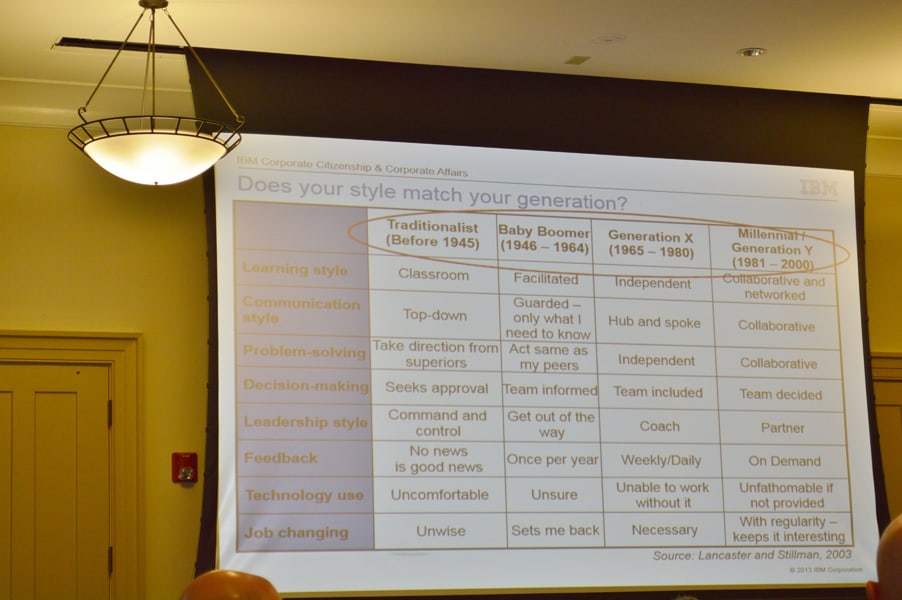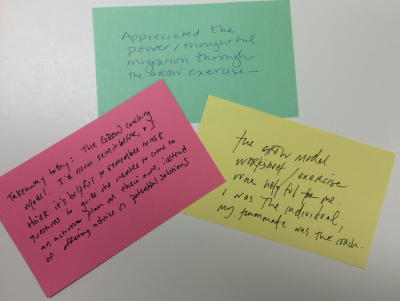Q: What do influence and influenza have in common?
A: They’re both contagious.
What a delightful opportunity to collaborate with interested leaders from across the business, non-profit, and academic sectors! — Russ Shafer-Landau, UNC Parr Center for Ethics.
 On Friday, September 18th, the North Carolina Center for Public Policy Research, in partnership with the UNC Parr Center for Ethics, hosted a leadership and collaboration workshop on the UNC-Chapel Hill campus. Sponsored by an IBM Impact grant, the day convened leaders from the business, nonprofit, academic, and foundation fields to focus on a shared vision of authentic and ethical public policy leadership. Throughout the day, attendees voiced shared challenges facing the policy discussion, organizational leadership, and experimented with methods to understand and better engage with fellow collaborators.
On Friday, September 18th, the North Carolina Center for Public Policy Research, in partnership with the UNC Parr Center for Ethics, hosted a leadership and collaboration workshop on the UNC-Chapel Hill campus. Sponsored by an IBM Impact grant, the day convened leaders from the business, nonprofit, academic, and foundation fields to focus on a shared vision of authentic and ethical public policy leadership. Throughout the day, attendees voiced shared challenges facing the policy discussion, organizational leadership, and experimented with methods to understand and better engage with fellow collaborators.
You can’t fool yourself as to who you are — IBM Consultant
Several consistent messages emerged during the day. Attendees concentrated on defining a personal message, and how to get that message across to a variety of audiences. As one participant said, being “authentic” in all your actions and communications is not always easy. Participants encouraged each other not to worry about being liked by everyone, but to instead focus on bringing your best self — your “bright eyes” — to each meeting and opportunity.
Leaders also discussed the high priority on using data and performance measurements to make their cases to different audiences, and the necessity to constantly communicate the vision for your organization.
A look at emotional intelligence, a significant component of authentic leadership, reminded us all that different people have diverse motivations for doing things. This is especially true when working with people across generations. Millennials and Baby Boomers may have very different styles for decision-making and problem-solving, as well as how they want to receive feedback on their work. It is critical to build trust through relationships and teaching empathy. It is also vital to use multiple tools to persuade others inside and outside of your organization in order to gain consensus.
During the day, IBM consultants led participants through exercises on personal branding, persuasion and influence, and mentoring and coaching. One exercise focused on the G.R.O.W. model of coaching:
G – GOAL
R- REALITY
O – OPTIONS
W – WAY FORWARD
Participants paired up, with one acting as a coach/mentor and the other as the mentee. Coaches guided their partners through a series of questions designed to help mentees discover their own solutions to solving problems and reaching goals. The participants then switched, so each had the opportunity to practice both roles.

The afternoon wrapped-up with a discussion of persuasion and collaboration. Participants gathered in groups to “pictorialize” principles of persuasion: reciprocity, scarcity, authority, commitment, consensus, and likability.
The workshop provided an opportunity to bring together a diverse group of leaders to network, learn, and reflect on our own leadership — specifically how we lead authentically and ethically; and how we can collaborate to strengthen each other, to strengthen public policy, and ultimately benefit North Carolina.
As one participant noted
“You can’t do everything yourself… You need help from others”
We are fortunate in NC to have leaders such as IBM providing that help, as they lead in their commitment to investing in nonprofit capacity-building and impact through their IBM Grants program.
At the end of the day’s activities, the group was asked to reflect and give feedback on their discussions.
Best feedback in the shortest # of words?
The N.C. Center for Public Policy Research, a nonprofit organization dedicated to strengthening public policy through nonpartisan research, education, and community engagement, has benefited from four IBM Grants: Social Media, Digital Marketing, Web-User Analysis, and Leadership & Collaboration. Each has built on the previous partnership to progress the Center’s mission.
Politics

